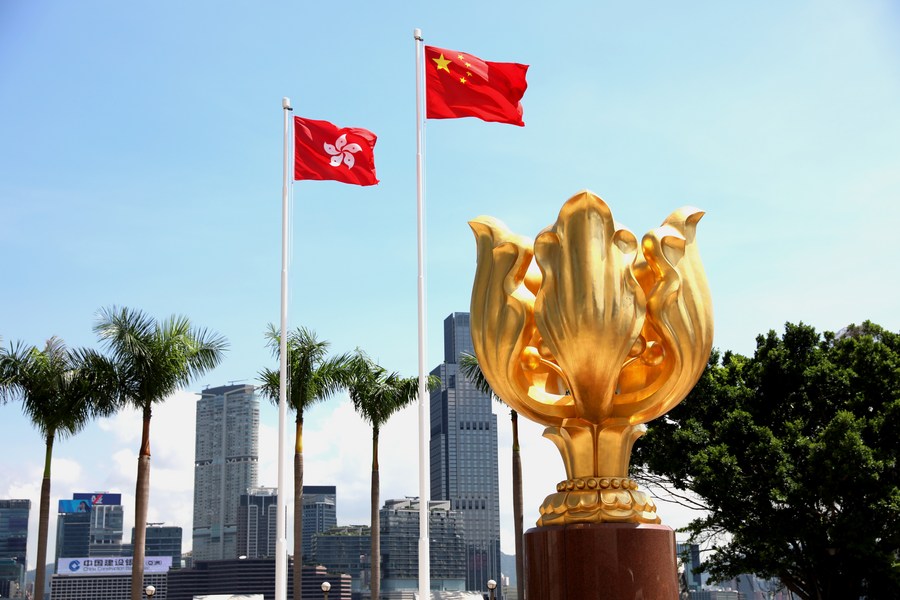Record on HK groups' disbanding needs to be set straight
By Mervyn Cheung Man-ping | China Daily Global | Updated: 2021-09-06 09:33

As some politically leaning social and industry-based organizations have over the past few weeks, or are facing the prospect of dissolution in the near future, accusations are in the air that the Hong Kong Special Administrative Region's government is mounting crackdowns on organized pro-opposition groups.
Such an imagined scenario is being promoted by groups exploiting the hardened tone of State media on the Chinese mainland regarding offenses committed by such politically biased bodies and a pledge by the head of the Hong Kong police to hunt for violations of the National Security Law for Hong Kong.
In the case of the abrupt resolution by the leaders of the Professional Teachers' Union to end the organization, concerns have since been orchestrated over the future of activist groups amid what has been called an "increasingly difficult environment". This has misled some people into believing that people's freedoms are being curtailed.
This is a fallacy that calls for redoubled efforts on the part of the SAR government to set the record straight on what has happened.
First, the decision to step out of business-in the instances of the PTU and the Civil Human Rights Front, an umbrella group behind many protest rallies-was made by the opposition bodies themselves, based probably on their own assessment of the circumstances surrounding their existing work portfolios.
The disintegration of the CHRF came on the heels of the declared breakup of the teachers union on Aug 10, and it was said that the organization had no alternative but to discontinue, given that its key leader was sentenced to jail and its affiliated member groups dropped from 48 to 10 as a result of a massive pullout.
The decision to disband was made independently by both organizations, although it was believed that they might find it subjectively hard to "continue to survive under the current political pressure". The teachers union was denounced as a professional organization by the Education Bureau over its record of unconcealed engagement in political activism, which was deemed unacceptable.
On the law enforcement side, the police commissioner vowed that "thorough investigations" will be conducted into any violations by the teachers union under the security law. And pending the release of its inquiry details, the police asked the CHRF in April for its funding sources, its role in a petition handed to the United Nations calling for an international investigation into claims of police brutality during rioting in 2019, and the reasons for its noncompliance with the obligatory registration with the government under the Societies Ordinance. The organization argued that it was not obliged to respond to such questions, since it had never been asked about its status since it was established in September 2002.
Hard-pressed by the need to preclude any recurrence of the social disturbances and street violence that devastated the city in 2019, the National People's Congress Standing Committee promulgated the National Security Law for Hong Kong on June 30, 2020. The law bans acts of subversion, secession, terrorism and collusion with foreign forces and applies to all social bodies regardless of their political stance.
If an organization does not commit such misdeeds, there is no reason for it to feel compelled to give up its lawful endeavors. The CHRF has mounted large-scale defiance rallies on July 1(the HKSAR's founding anniversary) every year since 2003, except for 2020. The CHRF filed an application for the same event last year-despite the pandemic-induced rules restricting large gatherings, which rendered the petition objectionable to the police on public health grounds.
This year, the political front did not organize the same mass rally, on the grounds of the recent 18-month imprisonment of its convener over an unauthorized massive protest in 2019 and an ongoing investigation into its legality.
In either case, the noncontinuation of the ventures by the organizations in question was entirely self-determined. If the mass activities conducted in their names are all legal, it does not stand to reason that they should disband, and neither should it be implied that the SAR government, or even Beijing, was involved in the dissolution.
As the SAR's chief executive, Carrie Lam Cheng Yuet-ngor, has put it, the recent operational shutdown of the social and trade bodies in question has nothing to do with freedoms per se. It is rather a question of whether such community or trade associations are pursuing subversive political agendas disguised as a civil group.
It is only with the wider community being able to comprehend the intricacies at play that the political farce undermining public faith in the government will come to a standstill.
The author is a member of the Chinese Association of Hong Kong and Macao Studies.
























